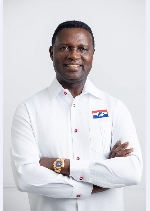PHFAoG calls for gov't's support at 4th annual conference
 PHFAoG logo
PHFAoG logo
The Private Health Facilities Association of Ghana (PHFAoG) has urged the government to strengthen collaboration with the private health sector to improve healthcare delivery in the country.This call was made at the 4th Annual General Conference of the association, held from September 18 to 20, 2024, at the Baca Hotel and Event Centre in Koforidua.
The event, themed “Adopting a Data-Driven Decision-Making Culture as a Tool to Create a Responsive Healthcare System in Ghana,” was attended by notable figures from both the public and private health sectors.
Among the dignitaries present were Nana Osei-Bonsu Sempeh II, Oyokohene and Adontenhene of New Juaben; Dr. Anthony Nsiah Asare, Presidential Advisor on Health; Alexander Akwasi Acquah, Deputy Minister of Health; Dr. Philip Bannor, Registrar of the Health Facilities Regulatory Agency (HeFRA); and Dr. Dacosta Aboagye, CEO of the National Health Insurance Authority (NHIA).
During the conference, PHFAoG leaders emphasized the need for a data-driven decision-making approach to improve health outcomes, resource allocation, and service delivery.
The Association pointed out gaps in the District Health Information Management System (DHIMS2), particularly in the private sector’s ability to access and utilize data for decision-making.
Although the private health sector is the second-largest provider of healthcare services after the Ghana Health Service (GHS), the Association noted that restrictions on data use have hampered their ability to contribute effectively.
In a significant development, PHFAoG announced that, following advocacy efforts, the GHS has granted the association user access to the DHIMS2 system.
This will allow private health facilities to have more control over their data reporting, improving the accuracy and completeness of health data across the country.
A major issue raised by PHFAoG was the shortage of skilled healthcare professionals in the private sector.
The Association highlighted the difficulty in retaining trained health information officers and other essential personnel, many of whom leave for public or CHAG (Christian Health Association of Ghana) institutions after receiving additional training from private facilities.
The conference also brought attention to the broader issue of health worker migration, with Dr. Anthony Nsiah Asare revealing that only 1% of Ghana’s health workforce is employed in the private sector.
PHFAoG called on the government to support the private sector by including them in financial clearance processes for healthcare workers and extending other support systems.
The Association expressed concern over what they described as “unrealistic” regulatory standards imposed by HeFRA and NHIA.
They argued that comparing Ghana’s healthcare standards to those of more advanced countries is impractical, given the disparities in access to resources and financing. PHFAoG specifically criticized the 40-bed capacity benchmark for private primary hospitals, noting that many facilities struggle with low patient attendance and increasing overhead costs.
While praising NHIA’s recent efforts to clear outstanding claims, the association called for a fast-tracked tariff review process, stressing that current tariffs do not reflect market realities. PHFAoG noted that the practice of co-payment, though discouraged by the NHIA, has become necessary for many facilities due to insufficient reimbursement rates.
The conference also addressed the financial challenges facing private health facilities, particularly small-scale operations.
PHFAoG called on the government to revisit the withholding tax regime, which they argue disproportionately affects smaller facilities that purchase medical commodities in smaller quantities.
The Association also renewed its call for tax waivers on the importation of medical equipment, which would enable private health providers to procure advanced diagnostic tools at a lower cost.
In response, Dr. Nsiah Asare reassured PHFAoG that the government remains committed to partnering with the private health sector.
He announced plans to introduce a flat tax rate system and deepen collaboration through public-private partnerships (PPP) that would provide private facilities with essential medical equipment and devices.
This was contained in a communique signed by Dr. Kwame Buabeng-Frimpong, PHFAoG President, and Richard Frank-Torblu, General Secretary
Source: Classfmonline.com/Cecil Mensah
Trending News

Veep graces 70th anniversary of Girls’ Brigade Ghana
12:58
GA/R: MP for Ayawaso North cuts sod for construction of inner drains
05:41
VP Naana Opoku Agyemang opens ICASA 2025, calls for Africa-led healthcare solutions
13:33
Minority Caucus condemns poor 2025 WASSCE results, calls for urgent action
14:17
KG Agbodza: Roads Minister says GHS5b road budget inadequate
18:51
41st National Farmers Day opens in Ho with strong call for food security, innovation and collaboration
22:30
Interior Ministry probes claims of attempted attack on Special Prosecutor
12:27
82-year-old farmer crowned overall Best National Farmer at 2025 awards
05:29
Ga Mantse unveils plans to transform Agbogbloshie Market into a 100,000 stall modern complex
13:16
Hajj agents urged to channel concerns through Ministry for better coordination — Ahmed Ibrahim
13:48



